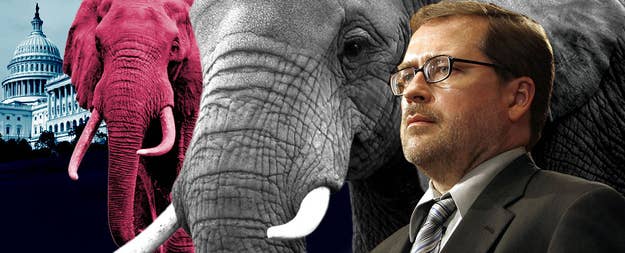
WASHINGTON — Liberals, and some members of the Republican leadership if truth be told, may hope that conservative agitator Grover Norquist’s days as a political kingmaker are over — but that doesn’t mean his influence is actually waning.
In recent days a handful of Republicans, including Sens. Lindsey Graham and Saxby Chambliss, as well as Rep. Peter King, have rejected in whole or in part Norquist’s no-tax-increase pledge, to great media fanfare.
Those statements have, predictably, led to much speculation that the influential chief of Americans for Tax Reform has lost his iron grip on the Republican Party’s tax and spending policies.
In an interview with BuzzFeed, Norquist dismissed those criticisms, noting that “we went through all of 2011” hearing how the debt ceiling would mean “the pledge was going to be broken.”
“This is like turning in last year’s homework again,” he added, arguing that until Republicans actually begin voting for tax increases, “it’s a way to get on TV … [but] at the end of the day, no harm, no foul.”
That said, Norquist has indeed seen his influence shrink in the last year. Republicans have been increasingly willing to cross swords with him, and veterans of Capitol Hill suggest that his fight with Sen. Tom Coburn earlier this year damaged his standing within the party.
Additionally, Republican leadership in the House and Senate has long chafed at his influence, while lawmakers, particularly in the Senate, where every member sees themselves as a future president, naturally dislike the appearance of being in the thrall of an outside power.
But to count out Norquist and his anti-tax pledge would be a mistake. Here’s why:
1. Most Republicans Agree With Him
Much of Norquist’s power comes from the simple fact that he’s cornered the market on cornering Republicans on an issue they already support — opposition to new taxes on anyone, regardless of income.
In this very real sense, Norquist is less Kingmaker and more Gatekeeper of the Obvious, enforcing the one principle that social conservatives, defense hawks, fiscal conservatives, genteel Northeast Republicans, and Southern firebrands alike agree on: Ronald Reagan’s no new tax pledge.
And Republicans who haven’t signed the pledge generally agree with the notion that tax increases are a nonstarter, at least in terms of hiking tax rates.
Even those who have publicly broken with him have numerous preconditions for voting for an increase that, at least as far as Norquist sees it, make them unlikely Obama allies.
For instance, Norquist told BuzzFeed that following Graham’s statements, he talked with the South Carolina Republican about the issue. After hearing the number of qualifiers Graham had in mind, he quipped, “You’ve described a unicorn that you’d vote for. Unicorns don’t exist in the real world. I am officially not worried.”
2. “My opponent pledged to not raise taxes, and then he did.”
The power behind ATR’s pledge is not Norquist's personal clout. It’s the threat of a 30-second campaign commercial in a Republican primary.
“The pledge has made it easy for people to communicate with voters in a credible way that they won’t raise taxes. Politicians since the pharaohs have been promising to not raise taxes and lied about it,” Norquist notes.
With Republican primaries becoming more blood sport than coronation of a party favorite, incumbents are increasingly unwilling to stake out controversial positions with base voters. And nothing is more universally unpopular with Republican base voters than tax increases.
Although Norquist insists his pledge is “not a cattle prod” he uses to maintain loyalty, the threat of a conservative challenger using the pledge in campaign commercials and debate one-liners is real.
And the grass roots isn’t likely to forget members who break the pledge: Norquist has set up some 60 regular meetings of like-minded conservatives in 48 states over the years, giving him and ATR a powerful grassroots base of their own.
3. Democrats Control the Senate Anyway
It’s clear that Republicans in the Senate are increasingly uncomfortable with Norquist’s dogmatic opposition to any new taxes of any kind, and more importantly, his insistence that almost any new streams of revenue be classified as a tax increase.
Coburn, Chambliss, and Graham may have openly defied him, but a host of other Republicans are also looking at things like capping deductions as a way to find new money for federal coffers.
But while Senate Republicans may be willing to deal with Obama on revenues — assuming he and Majority Leader Harry Reid are willing to drop rate increases — that only goes so far toward an actual agreement, thanks to a House Republican conference still heavily invested in the broad opposition to new taxes.
4. 93%
The House of Representatives is where the pledge, and its father, really reign. Come January, 93% of Republicans in 113th Congress will have signed the pledge, and the vast majority of the remaining 7% are loath to increase taxes.
True, 11 of the new Republican members of the House didn’t sign Norquist’s pledge — but 24 did, a clear demonstration of its continued popularity within GOP circles.
Speaker John Boehner has made it clear that he won’t entertain a deal with tax rate increases in it. While that leaves the door open for other revenue-raising measures, it’s unclear just how wide open it really is at this point.
And Boehner has already made clear that he must have a majority of his majority supporting any agreement on the fiscal cliff — and even went so far as to tell his colleagues that he would push for an agreement that garners 2,118 Republican votes, which would foreclose the need for Democratic votes at all.
